(Courtesy of JLIC) In a remarkable demonstration of commitment and duty, five of the OU’s JLIC directors made the difficult decision to venture from their leadership roles of providing a vibrant religious life on secular college campuses to guiding soldiers in the heart of conflict with spiritual leadership on the battlefield. Volunteering for military duty in Israel with the IDF, these rabbis seamlessly transitioned from forging deep and meaningful relationships with students on campus to serving as role models to fellow soldiers in Tzahal.
Rabbi Yehudah Auerbach, the Sharpshooter: Transformation Through Tzitzit, Torah and Tefillot
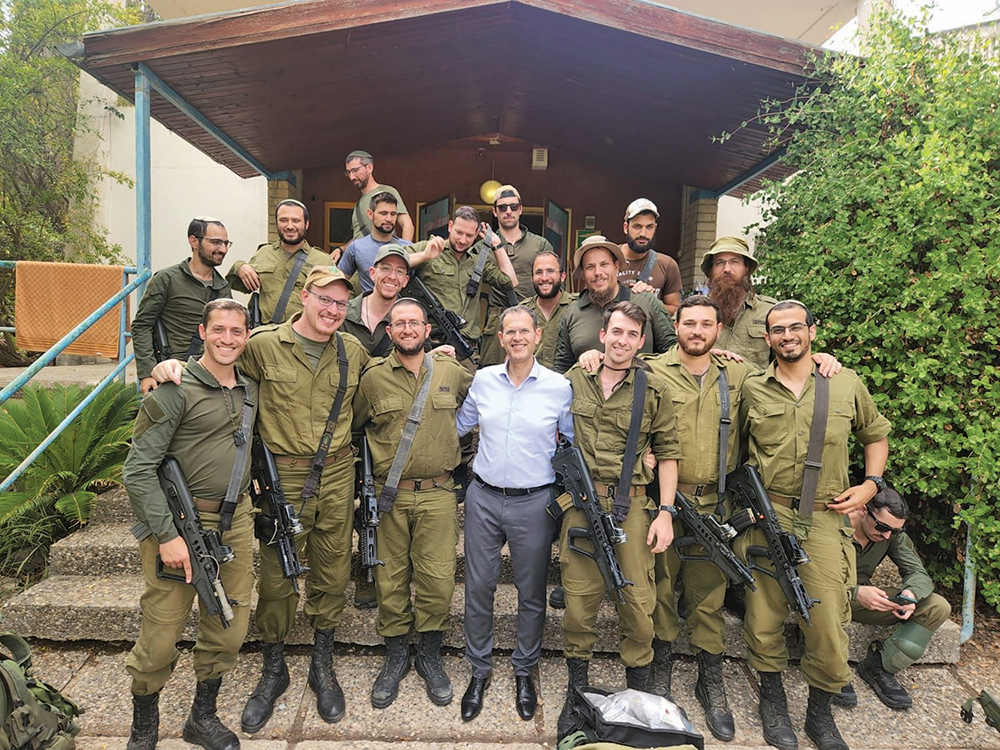
Beloved by college students at the University of Chicago where he serves as JLIC director, Rabbi Yehudah Auerbach left his family 6,000 miles away to enter an active war zone. A sharpshooter, Rabbi Auerbach explained that the decision he and his wife made together was rooted in ideological unity. “If we were living in Israel then we wouldn’t have had a choice,” he said, “so just because we’re in Chicago didn’t mean that we should stay on the sidelines while all my unit was called up. We resolved that it was right that I go.”
Amidst the chaos of wartime, Rabbi Auerbach saw moments of respite, and seized the opportunity to assume a leadership position in teaching Torah. “We found ourselves with some downtime in between missions and training, and decided to start getting together and sharing Torah,” he recalled. Rabbi Auerbach’s initiative led to a daily shiur, and soon he was also teaching a Daf Yomi class to his unit.
Shiurim in the army were held in unlikely places—a park bench in a Yishuv, a field in the south, or a shul in a secular kibbutz that had not been used regularly in years. “It was incredibly special and empowering to be able to prepare and give over Torah, especially while paired with the active shmirot and other missions to physically help the Jewish people,” said Rabbi Auerbach.
Rabbi Auerbach described being “stunned” by the unexpected transformation among his fellow soldiers. “Soldiers who rarely involved themselves in spirituality became integral parts of Torah learning,” he noted, marveling at the resurgence of Jewish practice and devotion. “The amount of tzitzit being worn, Torah being learned, and Tefillot said were really astounding and inspiring to me. In a strange yet wonderful way, the entire experience was tiring and profoundly invigorating at the same time.”
Highlighting the unity among soldiers from diverse backgrounds and regions, Rabbi Auerbach said he felt “spiritually uplifted and inspired” to see people who just a few short months ago were “at each other’s throats due to the political strife in Israel, now coming together and hugging each other in times of need.”
Reflecting on the experience, Rabbi Auerbach sees this period as a pivotal moment in Jewish history that will be looked back upon in years to come. “When we do so, what will we say that we did, how did we react, how did we pitch in to help the Jewish people? To actively assist, protect and defend our brothers and sisters in a time of dire need is something that I view as a privilege, and I am both proud and grateful to have been able to be a part of it.”
Rabbi Ben Menora, the Commander: Heroes on the Homefront, Coffee Talks and JLIC Skills Tested on the Battlefield
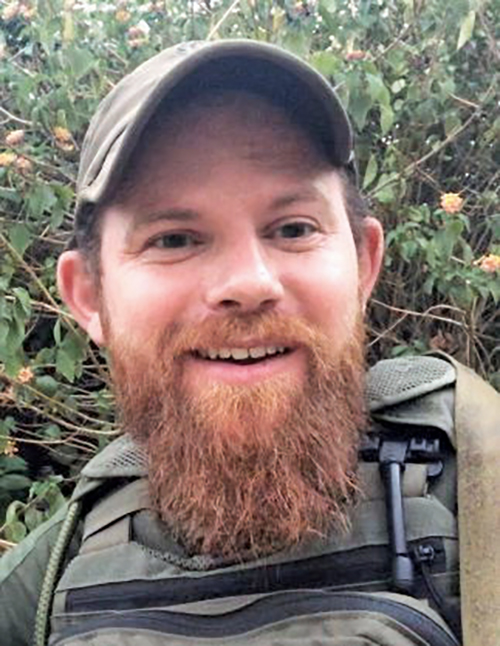
As a commander in an infantry reserve unit, Rabbi Ben Menora of Binghamton University acknowledges the unseen strength behind the military’s frontlines. “While most people see the soldiers in uniform, the heroes are their families—the spouses at home, with the kids, doing their best to radiate calm and normalcy when life is anything but.”
In an atmosphere of diverse religious backgrounds, Rabbi Menora initially kept his observance private. His journey as a JLIC director, however, significantly transformed his approach in the army, encouraging him to be more outgoing and fostering deeper connections.
“My JLIC director skills were put to the test from day one of the war,” he said. “I made a conscious effort to quickly learn the names of every single soldier in my Pluga of about 100 guys, found myself in deep conversations with guys I just met, schmoozing about life, business, relationships and religion.”
He became a source of inspiration, engaging in impromptu discussions, serving as an emotional support figure, and offering Torah insights. “I found myself having endless ‘coffee talks’ and chavrutot,” he shared, embracing his role as a spiritual guide within his unit.
Rabbi Menora soon became the default speaker on Shabbat to say a few words of Torah and inspiration. “Basically, I was serving as a JLIC director for my unit. Within a few days the Mefaked Pluga (company commander) appointed me as the rav of the Pluga and directed halachic and ethical questions my way.”
Rabbi Menora’s ability to connect with members of his unit facilitated bridge-building between religious and secular soldiers. He said it has been “astounding” to see the surge in religious experience amongst the troops.
“We arranged tefillin giveaways for soldiers who started to put on tefillin daily and some guys, including those who have stated they do not keep Shabbos or kosher, started wearing tzitzit all the time,” he said. “Before heading out to one maneuver, our Mefaked (commander) read straight from the Rambam about not being afraid at war, and guys held on to that, still quoting the Rambam weeks later.”
Reflecting on past avoidance of religious discussions due to their politicization, Rabbi Menora found a refreshing change in the army. “Conversations have become respectful and enlightening, with a genuine desire to understand each other’s positions,” he noted, highlighting the unit’s newfound unity through sincere dialogue.
Rabbi Tzvi Wohlgelernter, the Uplifter: Spiritual Resilience Amidst Conflict
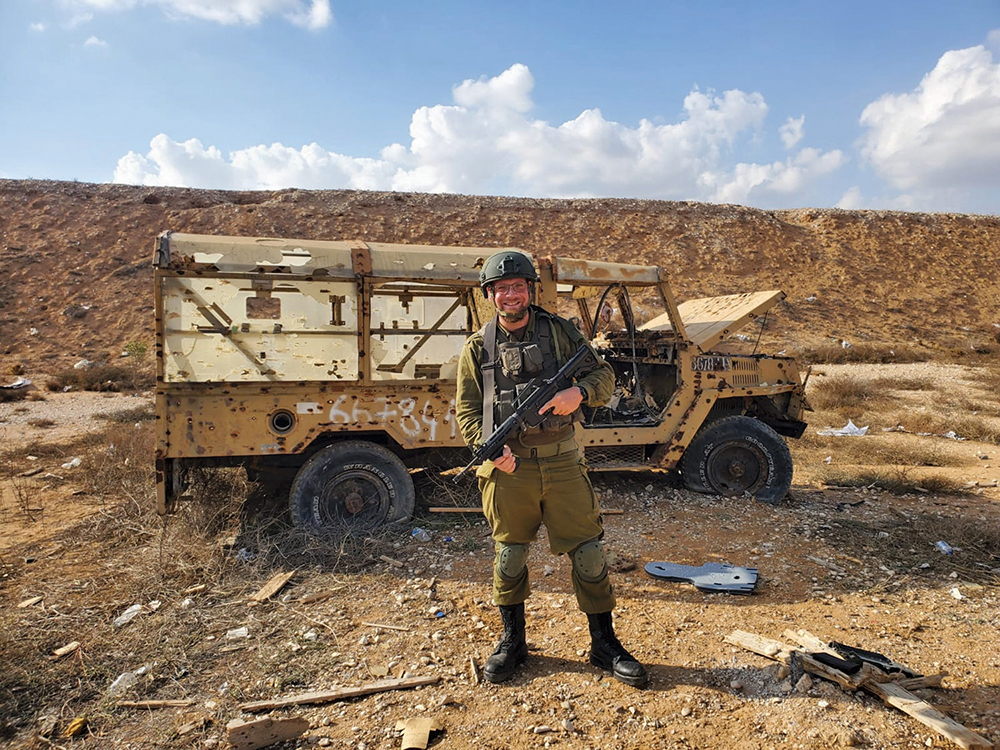
As senior JLIC director in Givat Shmuel and Bar Ilan University, Rabbi Tzvi Wohlgelernter swiftly transitioned from teaching Torah to young olim and students on campus to soldiers amidst warfare. “Here in the army, I’m kind of like a token rabbi, the unofficial rabbi of my unit,” he said.
Rabbi Wohlgelernter highlights the stark contrast between his former approach of disseminating scholarly Torah teachings to the JLIC community, compared to present times in the army, where the content is adjusted to appeal to a wider audience. “The messages—the way I speak—have to be towards a crowd that’s more diverse,” he said.
He crafts weekly write-ups based on relevant points from the Parsha, tailored for commanders to deliver to their troops. His Torah teachings now revolve around universal battle themes that resonate among soldiers irrespective of their religious backgrounds.
Rabbi Wohlgelernter details harrowing experiences, including missions collecting remains from conflict areas and preparing for emergency situations. “Our main objective is to be prepared and ready for when we get called into Gaza for emergencies,” he stated, reflecting the gravity of their duties during the ongoing conflict.
Yet, amidst the chaos and intensity, Rabbi Wohlgelernter remains steadfast in uplifting spirits. “We want people to be geared up, to be excited,” he emphasized. He is determined to bolster morale. “In the army, I try to conclude my drasha (sermon) with a powerful message from the Torah that we are strong, we will win this war, and we will defeat our enemies.”
Rabbi Ariel Cohen, the Influencer: Inspiring Unity Amidst Challenges
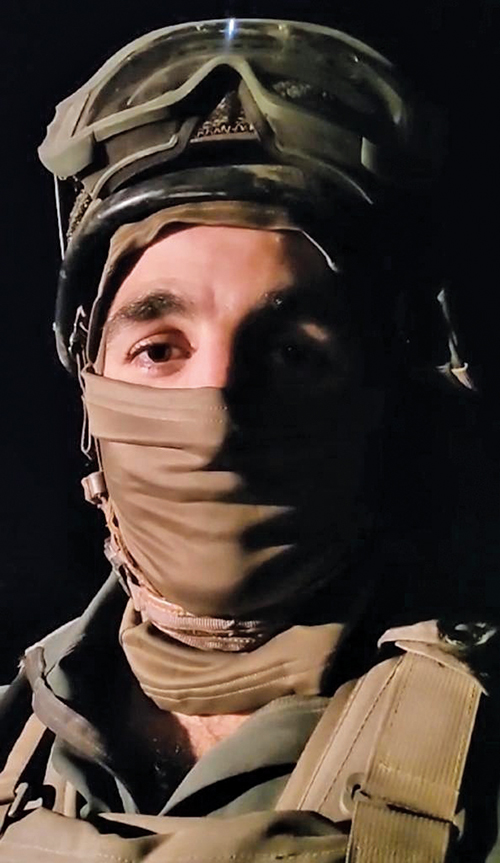
Rabbi Ariel Cohen of Brandeis University, serving in the Bislach logistical unit of the IDF in Gaza, shared the unique struggles of being away from home for an extended period. “I have been away for six weeks. It is very challenging, but this is a מלחמת מצווה and we have an obligation to make sure that we have ארץ ישראל to come back to,” he expressed, highlighting the solemn duty that propelled him into action.
Rabbi Cohen found solace in an extraordinary realization: “To be honest, we don’t really have time in Gaza to study Torah. However, I think the fact that I am here fighting a war and students on campus are sitting in my house learning Torah with JLIC while I fight is quite incredible.”
One pivotal moment in Rabbi Cohen’s journey went viral—a video of him in his military gear, passionately encouraging students to reconnect with their prayers. This unexpected video resonated beyond its intended audience, spreading across various communities worldwide. Rabbi Cohen humbly reflected, “People texted me and messaged from all over the world about this video, which I never expected to be sent out. It was meant just for the Brandeis students to encourage them to daven for our soldiers. Somehow, it was sent to millions of people.”
The impact was profound. Individuals from diverse backgrounds shared how Rabbi Cohen’s message inspired them to deepen their connection to Judaism. “Some of the messages I received include a young guy who started to put on tefillin every day as a result of the video,” he shared. “Others reached out to my wife, Dorit, saying it gives them strength knowing the Jewish people are davening together all over the world.”
Rabbi Cohen highlighted the significance of the support from the Brandeis students, acknowledging their incredible assistance during his absence. “The Brandeis students were an amazing help to my wife, Dorit, and knowing that she was so supported by the students helped me feel at ease being so far away,” he emphasized gratefully.
Rabbi Eitan Philips, the Tank Loader: Zoom Blooms in the Desert
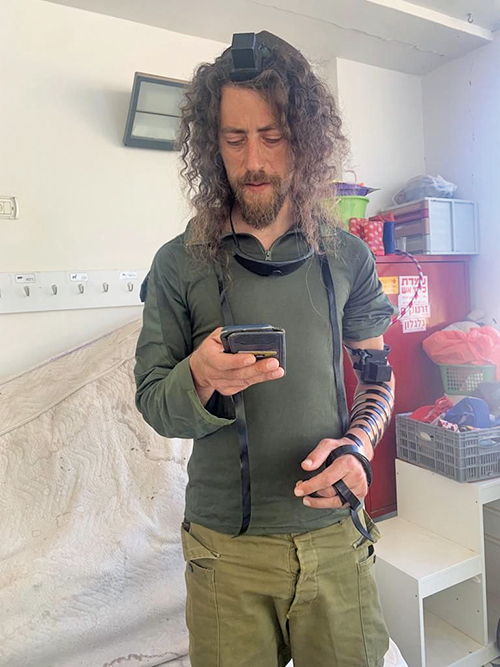
Rabbi Eitan Philips, JLIC director of the Dr. Mordecai D. Katz z’l JLIC at Tel Aviv University program, has ventured into a new realm of service in Shiryon, as a loader in tanks with the IDF.
Rabbi Philips was in Gaza without a phone while this article was being written, so his wife, Elana, spoke on his behalf.
Steadfast in his commitment to continue teaching Torah to JLIC’s international student community on TAU’s campus, Rabbi Philips used Zoom and WhatsApp videos to deliver divrei Torah to students, often from the unlikely setting of a warehouse amidst the tanks. Recounting the experience, Elana Philips shared, “There were moments when Zoom sessions were in the middle of the desert on an army base, and the connection wasn’t always cooperative. But the dedication to sharing Torah persisted.”
What stood out to Elana was the pervasive dedication to religious study among Rabbi Philips’ fellow soldiers. “There are so many religious guys in his unit and in combat in general who are learning all the time,” she remarked. “Their commitment to Torah study, even in the midst of their military duties, was inspiring.”
Despite the rigors of military life, Rabbi Philips finds moments of profound spirituality, particularly during Shabbat. “He has very meaningful meals with his unit, experiencing Shabbat together,” Elana said. These shared experiences foster unity and resilience among the soldiers.
Elana emphasized the intrinsic link between being an observant Jew and the call to defend Israel. “Being a soldier and fighting for the IDF comes hand-in-hand with being an observant Jew,” she affirmed. “It’s part of our religion and a mitzvah to protect our land and our people.”












